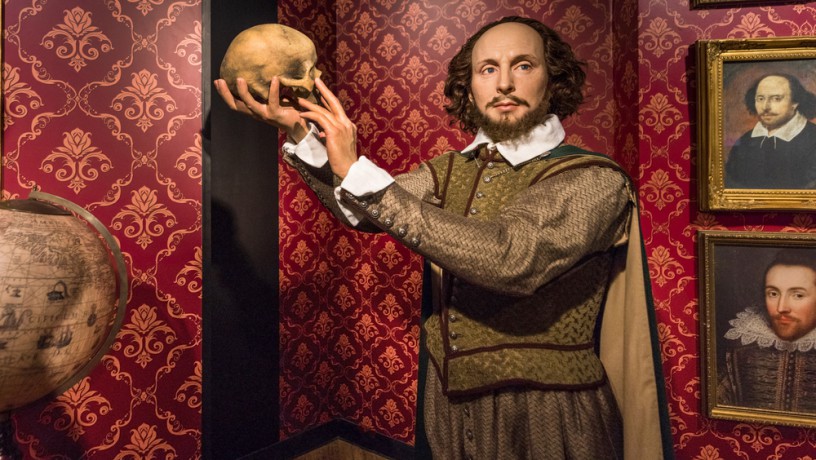As actors we all have our personal strengths. Like a baseball power hitter, we all have our wheelhouse–in other words our favorite type of role to play: that sweet spot where we’re confident we can hit it out of the park.
For some of us it may be working in serious drama; for some it’s playing the seductive romantic lead; for some it’s comedy. Some of us really love the wordy, intellectual roles, some favor the physical.
But no matter which of these or which combination of these is your type, there is one thing for certain: every one of these character types is rooted in the classics. That’s why there’s no escaping the fact that every modern actor should take some time to study classical plays. Even if you have no intention of ever performing a line of Shakespeare on stage, your craft and your instrument can benefit tremendously from studying his work and other playwrights that came after him. Here are a few reasons why.
1. Words, words, words
For lots of people unfamiliar with the language of the classics, especially Shakespeare, the first time they sit down and read him or watch a play can be not only intimidating, but downright bewildering. And if you ask an actor who has never touched the Bard to stand up and read something aloud, you’re setting him or her up for failure. The English language was not only a very different beast back then, iambic pentameter is, shall we say, a challenge. And there is a layering upon layers upon layers to the language that is difficult to sift through and divine the meaning from at first. However the good news is that with study, the richness, depth and beauty of the language starts to come out, and it is unparalleled in the Western canon. Mastering the nuances of iambic pentameter and understanding Shakespeare’s words means an actor can find depth and richness in any line you give him. You’ve heard some variation of the joke, “I’d pay money to hear Patrick Stewart read the phone book aloud.” As silly as that appears on its face, the reasoning behind it is sound: the man knows how to turn a phrase. Classical training can help you master not only physical qualities like diction and breath control, but also the ability to deliver meaning within and between the words you say in any piece of dialogue you are given.
2. Comic timing
Most of the shows we think of as purely modern comedies are actually very, very old. From Moliere and the Restoration comedies’ classic characters of the charming but rakish ladies man (think Charlie Sheen on “Two and a Half Men” or Neil Patrick Harris’ Barney Stinson on “How I Met Your Mother”) to the buffoonish, boastful fat man (think any modern sitcom ever) based on Shakespeare’s Falstaff, there is hardly a modern character in comedy that isn’t based on a very old model. If you want to learn how to perform comedy, the classics are the place to begin and end your studies. From the rhythms of the language of comedy, to how to play the energy and action of a comedic scene, to physical comedy, to the use of sharp-witted barbs, the classics have it all. To be able to take that energy and training into an audition for a modern comedy is to give yourself a tremendous advantage.
3. Let’s get physical
One often overlooked aspect of performing the classics is the use the actors must make of their entire instrument. The physical discipline required is so often overlooked because good classical actors make it look easy. But without the training it’s anything but. Consider for a moment the work a Shakespearean actor from his time would be asked to perform: there was no CGI, not much in the way of costuming, not even very developed sets beyond the merest suggestion of time and place. Thus if you were playing a king, how would you manage to portray it? What about a servant? Through posture, bearing, physicality and voice. Classical actors are trained in movement as well as language, and it shows, in films and television from the X-Men series to Star Trek to “Hannibal” and beyond. And an added bonus is that the physical training you get when studying the classics with someone who knows what they’re doing often translates to giving your presence a tremendous boost. There’s a stillness and economy of motion that classically trained actors employ that tells a story all on its own. When they do move, they move with purpose and deliberately, and it lends a whole new layer to their characterization. That applies whether they’re performing in a classical play or a modern crime drama.
4. Let’s talk about investing
For some up-and-coming actors, the question of studying the classics is met with something like, “Oh I just don’t have the time for that. I’m too busy auditioning.” Here’s the thing about studying the classics: the actors who have that kind of training on their resume get hired. And not because casting directors see some Restoration comedy on the list of their previous shows and hires them based on that alone. No, they get hired because they’re often the best actors in the room. Your development of any character in anything you do following some classical training will flower and blossom in ways you can’t even imagine. Classically trained actors have the training and technique to inject a depth and subtlety and nuance into any role, and this gives them a great advantage when it comes to reading for a part–especially when it comes to reading for a part, simply because you only have that minute and a half or whatever to make an impression. So to think about doing some training in the classics as taking away your time from more valuable or lucrative activities is exactly backwards: it will help you book roles.
5. Classically confident
They say if you can play Shakespeare, you can play anything. And that may be trite, but it’s true. Take actors who have been classically trained and plunk them in any audition for any type of role and it’s likely that they will have the wherewithal to adapt and find an action to play, simply based on their training and experience. If you want to make yourself not only a better actor but a more confident one, you could do worse than taking a class or two studying the classics!







